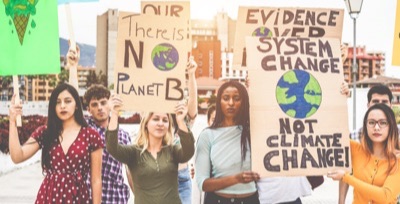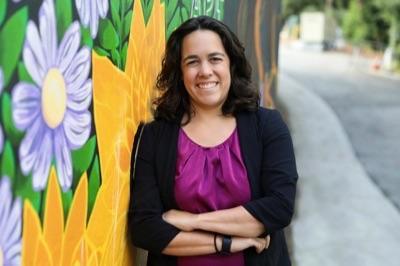Greta and Malala get the headlines, but for every young leader pictured on a magazine cover, thousands more are working tirelessly for causes like climate justice, racial and gender equality, LGBTQ rights, and economic change.
That's the message from Jessica Taft, a leading scholar on youth activism who says today's young leaders are building on the legacy of their predecessors who helped desegregate the South, reformed education in Chile, and won rights for working youth in Bolivia.
"Around the world, we are seeing children and youth engage as social, political, and economic actors, demonstrating their capacity to help make social change," said Taft, an associate professor of Latin American and Latino Studies at UC Santa Cruz. "Adults make a lot of assumptions about children and what they're capable of, and those assumptions are often quite false."
Taft, the author of Rebel Girls and the new book The Kids Are in Charge: Activism and Power in Peru's Movement of Working Children, spoke days before the Sept. 20 global, youth-led climate strike. She has spent more than a decade studying children's rights and intergenerational activism.
"Youth, given the opportunity to work alongside adults who are willing to manage their own power, can lead activist communities and organizations," she said. "To not include them is anti-democratic. They deserve to be listened to, to be seen as collaborators and treated as equals."
Recent decades have seen children and youth invited to participate in civic and political activities through schools and municipal children's councils, said Taft. But participating in adult-driven institutions is distinct from what has been unfolding in Peru for 40 years. As Taft details in The Kids Are in Charge, Peru is home to a "horizontal," child-led movement of about 10,000 young people ages 8-16.
The Movement of Working Children is focused on recognizing children as social, political, and economic contributors who deserve respect, dignity, and inclusion. "The goal is to build children's leadership and participation in social movements," said Taft, clarifying that it's not only about children’s work. "This organization provides on-the-ground support for kids to develop their capacity to address issues in their communities."
Children and youth have organized around the need for safe play spaces, like public parks, and for recognition of children's contributions to family enterprises, such as farms, market stalls, and helping with child care and cooking, said Taft. "The reality is children do meaningful work, much of it in safe and dignified conditions, and the image of the child worker needs to be more expansive," she said.
Other issues include reproductive health rights, climate and environmental issues, and building a gender-inclusive curriculum for schools. The youngest participants are about 8 years old, while regional leaders typically emerge at about 12 years old; national leaders are usually about 14, said Taft.
"I've seen 12-year-olds facilitate meetings better than 35-year-olds," she said. "We need to decouple experience and age. Sometimes the youngest kids get listened to the most."
By contrast, children in the United States don't see themselves as having rights, said Taft, who attributes that in part to what she calls "social amnesia" that has wiped away the memory of the youth who led the Greensboro lunch counter sit-ins, the 1968 East L.A. walkouts, and the undocumented youth movement that led to the creation of DACA.
"Developmental psychologists tell us that how people develop depends on the social, cultural, and political contexts of where they're developing," she said. "The exclusion of children from political engagement isn't inevitable. It's a product of cultural assumptions about childhood and adulthood."
The United States remains the only eligible country that has failed to ratify the United Nations Convention on the Rights of the Child, which marks its 30th anniversary in November, noted Taft. "The Convention has given children in other countries the ability to make demands on their schools and their governments," said Taft. "Here, we talk about children as objects of protection rather than people with rights."
However, youth in the United States are organizing around causes they believe in, including high-profile efforts like the Sept. 20 international climate strike, the campaign for gun control being led by survivors of the Parkland high school shooting, and a campaign to lower the voting age to 16 in San Francisco. These youth leaders are pushing back on the arbitrary quality of age-based criteria for political involvement, said Taft.
"There is a stubborn resistance to treating young people's political activism as normal, but the truth is that it's neither extraordinary nor exceptional," she said. "Children and youth are not on the sidelines. They are protagonists in the fight for their rights and their well being."




